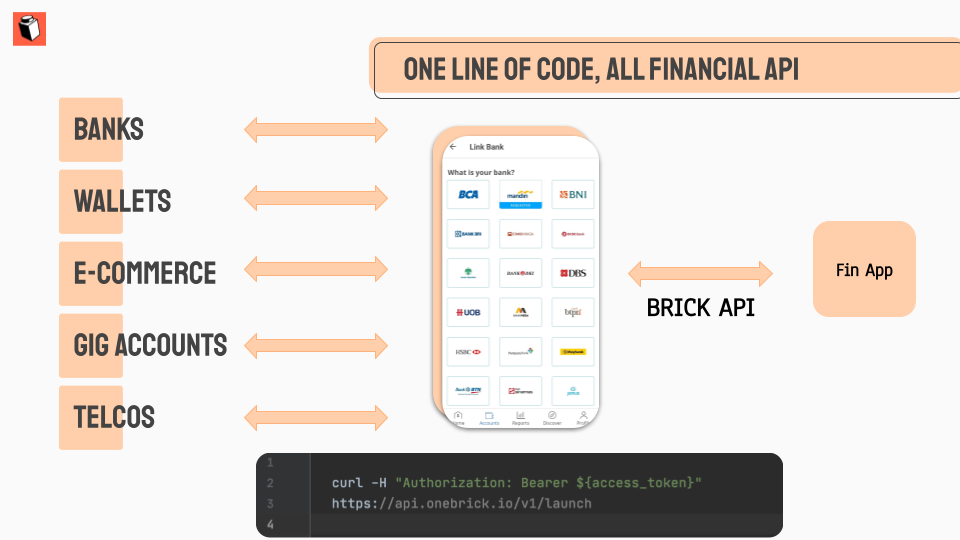The adoption of financial unrestricted is surging in Southeast Markets from the asian continent like Indonesia , a new region’s most populous the country. Founded by fintech experienced last year, Brick develops APIs that make it easier for technological companies to add identity proof and access financial data files from their users. It is current partnered with Indonesia’s eight largest banks, covering on average 90% of the country’s checking accounts, and plans to increase the size into all Southeast Japan countries.
Higher than three-fourths of Southeast Asia’s masse is unbanked or underbanked , meaning that don’t have a definite bank account or access to non-renewable lending services. Brick shall serve them as well, at products like mobile pockets and telcos APIs that are currently in beta along with slated for launch next one quarter.
The actual startup, which is now utilized by 250 developers and 27 tech companies, announced lately it has raised new seedling round. The amount of funding came undisclosed. Investors include move firms Better Tomorrow Efforts, PT Prasetia Dwidharma, 1982 Ventures, Antler and Move Cap Ventures, and angel backers like TrueLayer haead operating officer Shefali Roy, Cred chief executive officer Kunal Shah, Modalku CEO Reynold Wijaya, Carousell CEO Quek Siu Rui, and the founders ture of Nium, Xfers, Aspire, BukuWarung, ZenRooms and CareemPay.
Components was founded in 2020 by the chief executive officer Gavin Tan, an earlier employee at Aspire, one neobank for small- to assist you to mid-sized businesses, and major technology Deepak Malhotra, prior co-founder of Indian neobank Slice and a former PayPal engineer.
Brick’s APIs have been deployed just personal financial management, fog up accounting, lending, wealth remedies and neobank apps, and as a consequence Tan told TechCrunch it also sees use cases in to verticals like savings, stock options trading and financial planning.
Tan said started thinking of launching Brick despite working at high-growth fintech startups in Southeast South east asia, including Aspire, and coming across a lack of infrastructure that retarded product development.
“Without unified APIs like some of those provided by Brick, fintech companies have to spend months becoming aware of commercials, navigating differing techie standards and navigating changed data standards, before they could launch their app, ” Tan said.
Packet and other fintechs have gained from strong support starting from Indonesian regulators. For example , Lender Indonesia published open financial API standards in 2020.
Tan exclaimed the standards “represents concrete governance recognition of open savings principles, including consumer possession of data and the necessity of the companies consent to transfer as well as the use that data (which Tan describes as “a core principle that all this products adhere to”) but establishing a common language over banks and fintechs that enables the adoption of inserted finance. It also laid out implementation timelines for open APIs, beginning with payment initiation APIs in 2021, which Components will launch later this coming year.
Brick goes closely with Bank Philippines and Indonesia’s Financial Services License and is participating in Bank Kaum Indonesia’s Sembrani Wira connecting rod program.
The most obvious comparison with regard to Brick is to Plaid, the very financial API provider any helped enable the usage of open banking as well open finance in the United States, Ontario and European countries. A key differentiation, however , is that Plaid provides markets where the majority of many people a bank account.
On the other hand, “in Southeast Asian countries, only 25% of grown people regularly use a bank account, ” Tan said. “For this particular 75% unbanked and underbanked adults, their data dwells in alternative financial results sources. ” To utilize that market, Brick is regarded as building APIs for assorted financial data sources, want mobile wallets, telcos, feature providers, e-commerce platforms, colectivo security and tax doctor clinics.
The company happens to be focused on product launches in Indonesia, and plans getting started with expanding into other high-growth fintech markets, including Singapore, the Philippines and Vietnam, later this year.







